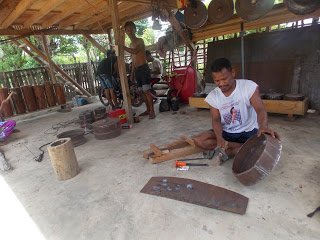Kumbili Art Community (KSK) is one of the traditional craftsmen who still survives in Palu City. Through the craft of traditional musical instruments, the community that comes from Kayumalue Pajeko Village, North Palu District is struggling to maintain the identity of local culture.
Lohis, Chairman of KSK, who is also one of the craftsmen of traditional musical instruments, told Lighthouse on Sunday (4/26/2015), said that the community was established since 2001, and often participated in art performances. The new KSK is active as a group of traditional musical instrument craftsmen in recent years.
"At first we just wanted to try. We think, if other people can, then we can also "said Lohis.
KSK now has 10 members. They have largely settled down and rely on working in forest processing companies such as rattan and wood.
"Activity as a craftsman of traditional musical instruments is only used as a side business" continued Lohis.
The community of traditional musical instrument craftsmen usually produce musical instruments such as kakula, gong, gamba, and gimba. They usually produce to order. The price of a set of traditional musical instruments produced by KSK also varies depending on the type.
"A set of kakula is usually sold at Rp.8.000.000 price" said Lohis while pointing to a set kakula just finished.
Traditional musical instruments produced KSK usually marketed to art communities in the city of Palu and surrounding areas. They are now also working on orders 12 pieces of gimba that reportedly will be used on Sail Tomini later.
The presence of KSK as one of the group of traditional musical instrument craftsmen also reap a positive response from the government. Some time ago, Kayumalue Pajeko Village, Roy Typhoon Sandjaya even launched the center of KSK activities in RW 02 as an arts and cultural tourism area.
KSK also received assistance from the Community Empowerment Program (PDPM) to build the cottage as a production site. This assistance is felt by Lohis as a form of government attention to local culture.
Lohis is now open to the younger generation at Kayumalue Pajeko who is interested in learning to create and play traditional musical instruments. From there, he hopes the richness of this local culture can continue to be passed on to the next generation.
"Essentially, through this tardisional instrument, we just want to maintain the local culture so as not to eradicate eroded era" he concluded.
